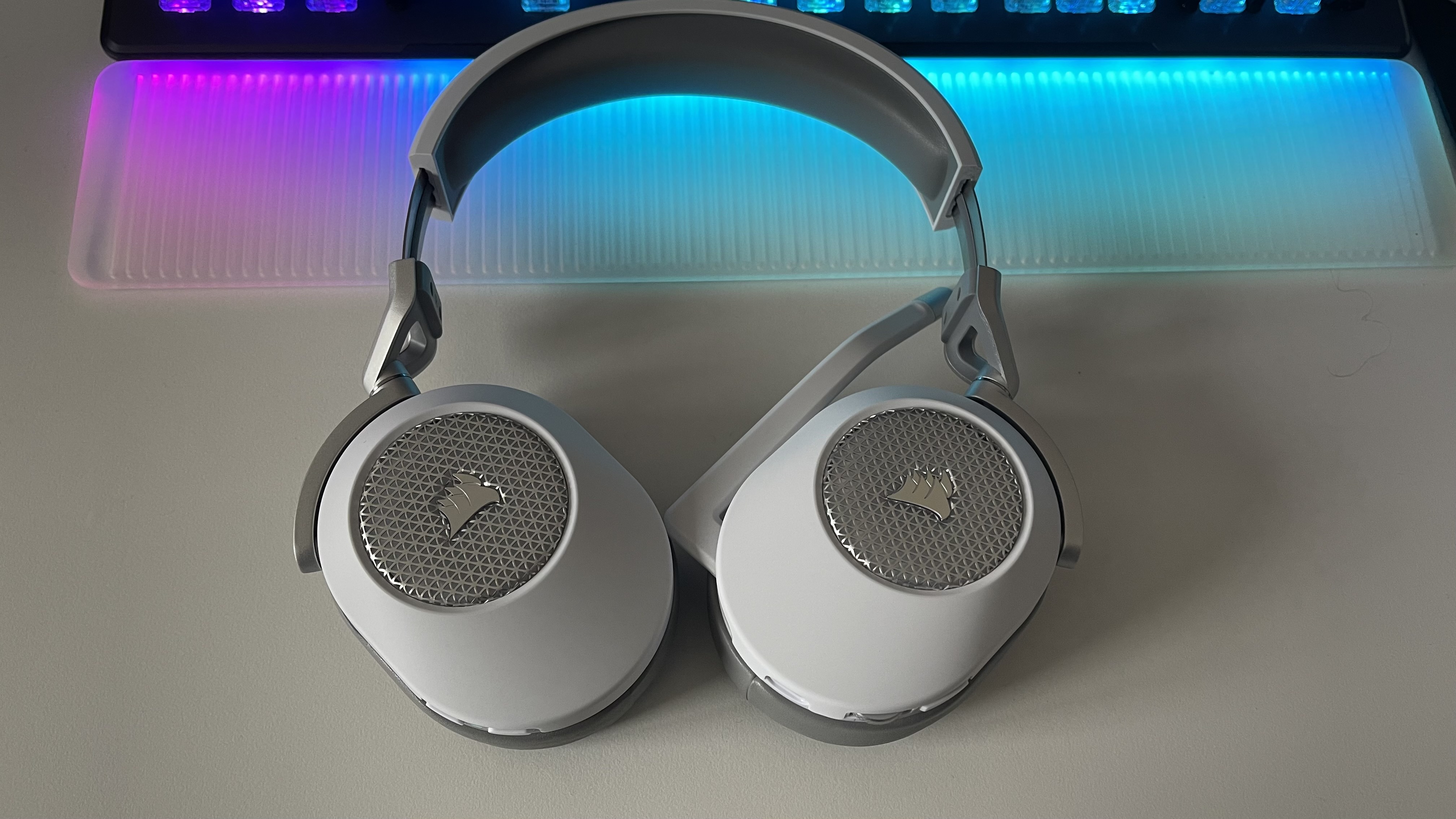GamesRadar+ Verdict
Corsair has brought its popular HS65 to a wireless audience, building on its predecessors success with supreme audio and excellent comfort. With new dual wireless connectivity and a range of additional (though perhaps unnecessary) features, there's plenty in here to satisfy those working with a $120 / £120 budget.
Pros
- +
Dual-wireless connectivity
- +
Lengthy battery life
- +
Solid and comfortable construction
Cons
- -
7.1 and SoundID aren't significant additions
Why you can trust GamesRadar+
Corsair’s headset team is on a hot streak. Not only is the HS80 Wireless headset one of the best the Californian manufacturer’s best ever, the cheaper wired HS65 has been one of the go-to headsets for under $100 since it released in 2022.
You can see what they’re thinking. Great higher-end wireless headset on this side, great wired budget headset on the other… *does the David Brent interlocking fingers*.
And so the Corsair HS65 wireless is born, and enters the market at $120 / £120. It’s a markedly different price point from the $80 / £80 its wired 2022 cousin occupies, but it does bring a sizable bag of tricks to justify that extra spend. We’d better delve into said tricks, then, and see how the latest release stacks up against the best gaming headsets on the market.
| Acoustic design | Closed back, over ear |
| Connection | 2.4GHz / Bluetooth |
| Drivers | 50mm |
| Compatibility | PC, PlayStation, Mobile |
| Wireless range | Up to 50ft |
| Frequency response | 20Hz - 20kHz |
| Battery | Up to 24 hours |
| Audio | Dolby Audio 7.1 |
| Mic | Omnidirectional |
Design
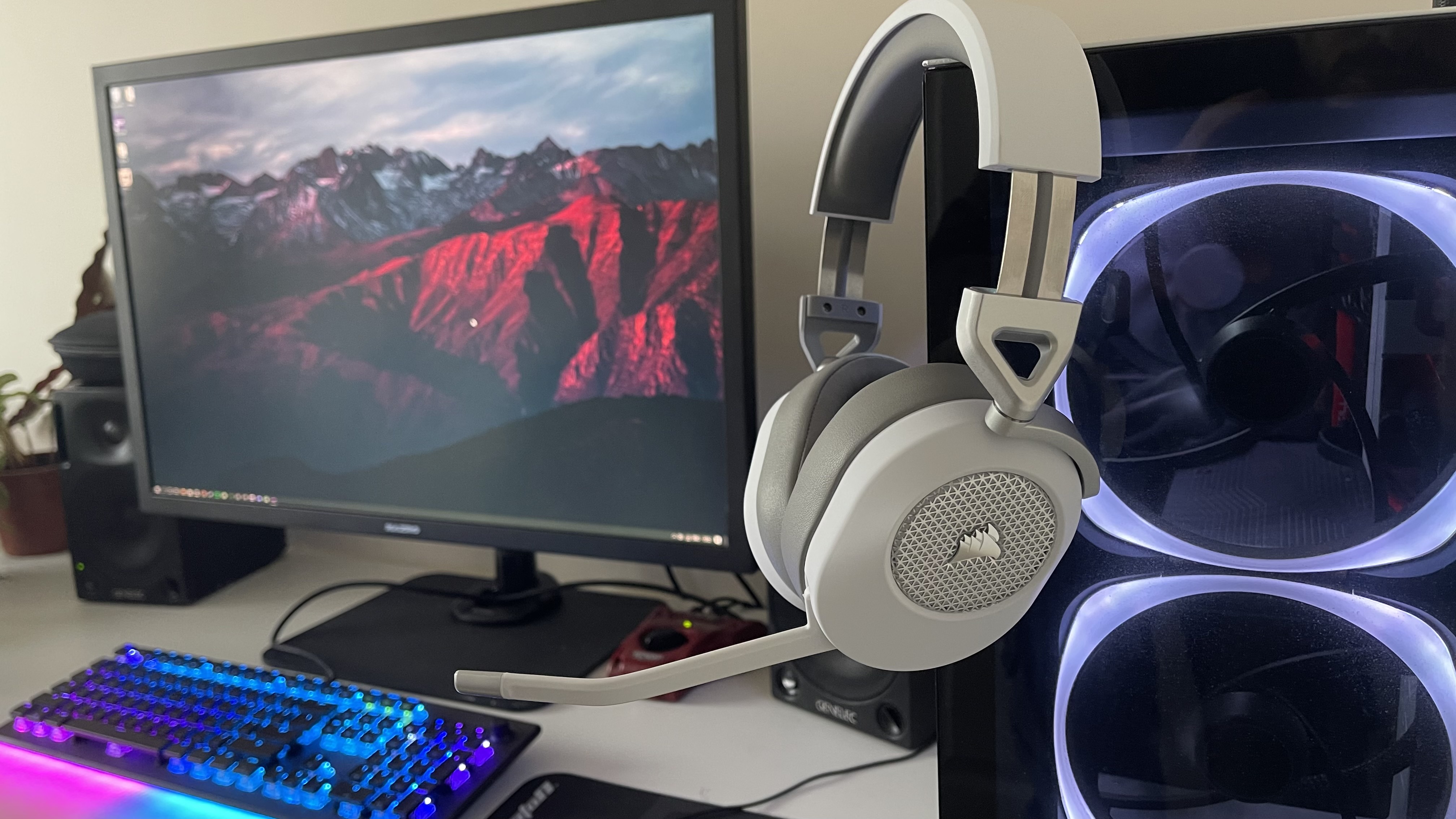
Using the wired HS65 as a visual reference, the new wireless gaming headset is a pretty safe bet for comfort. The earcups, frame, and appointments are largely unchanged - large oval earcups with a smaller metallic grille on their sides, a chunky headband built around a lightweight aluminium skeleton, and a non-detachable hinge mic that mutes when you push it up and away from your face. Like the broader Corsair headset range, it looks grown-up. No RGB, just well-finished white plastic and soft grey pleather cushioning.
The memory foam around the earcups feels like the high-grade stuff, and it really hugs your ears, even without the headband providing too much lateral clamping force. To keep things a bit cooler and drier around your ears, the pleather gives way to a silky fabric on the contact points of the pad. That little touch tells you how well-considered the overall design of these cans is. The look and feel is about right for this price point - premium, if not extravagant. They’ve kept the weight down, too - it’s just 275g. That’s light enough that most of us can wear it for longer sessions without feeling it dig in.
Features
Dual wireless connectivity is the headline act, with both Bluetooth and 2.4GHz wireless connections (via a USB receiver) available. That’s always a handy feature for a gaming headset, because it means you can easily hook it up to a smartphone, laptop or tablet and elect this as your all-purpose audio workhorse. The connection strength’s good enough for this reviewer to roam around most of his house without audio dropouts. Annoyingly it’s the kitchen - right by the fridge, would you believe - where my Discord chat gets a bit staccato. But what am I gonna do, not leave mid-round in PUBG for a snack?
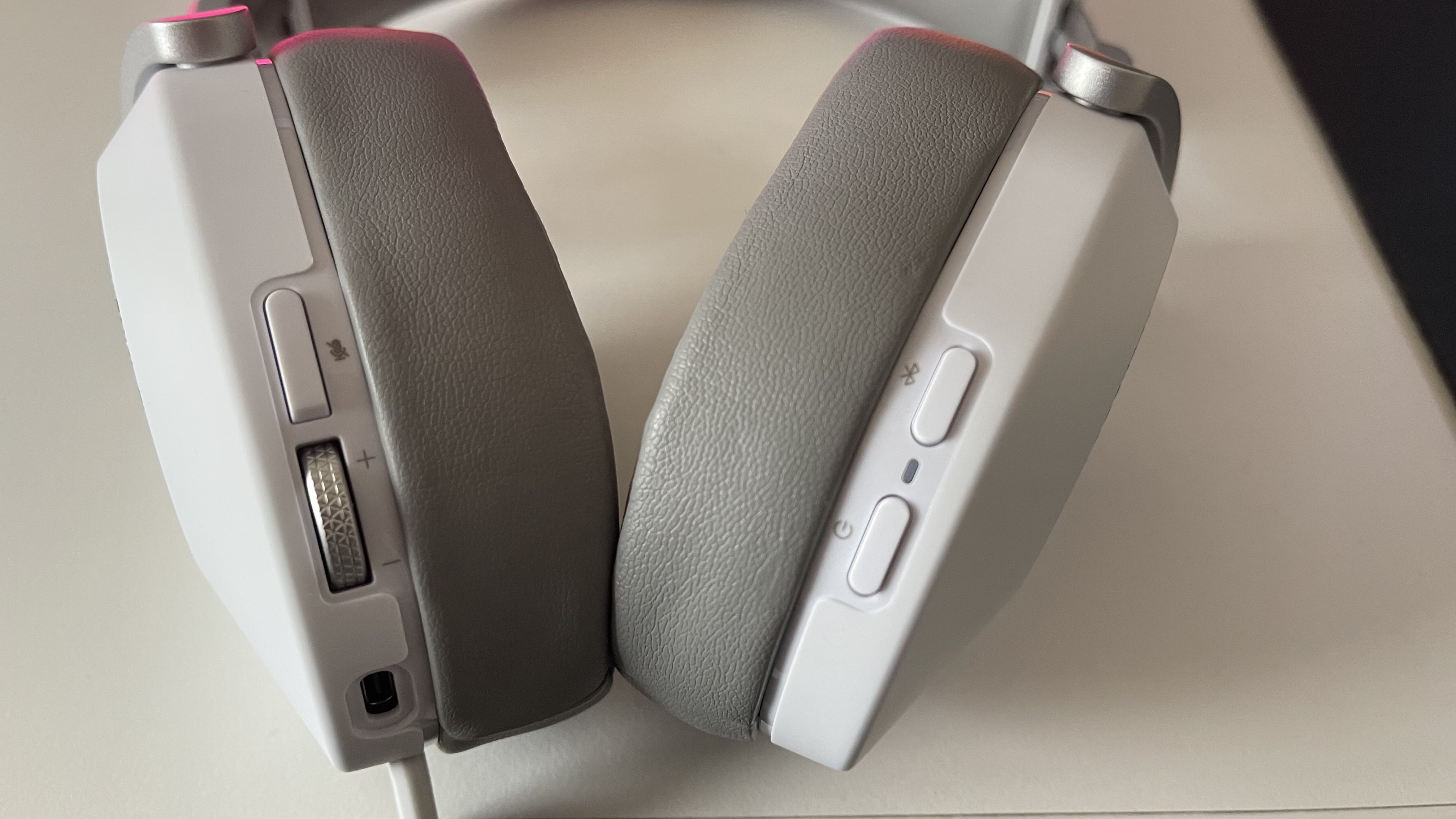
Joining that wireless connectivity on the features roster is a new EQ profiling system Corsair’s calling SoundID which promises to negate the need to twiddle with sliders and builds a profile for you based on a set of preferences and questions. While the sound out of the box is mighty impressive, SoundID promises to further tailor it to your specific demands without any need to get your hands dirty in EQ curves. In reality, it’s not a hugely significant feature.
The process of setting up your SoundID profile is well-designed, but the difference between the profile it creates and the average presets offered by headset companion apps isn’t dramatic. That said, if it lowers down the portcullis for users who felt overfaced or unenthusiastic about tweaking settings manually, it certainly can’t hurt for this option to exist. Just don’t expect it to significantly improve the audio quality.
Like the wired model, this one’s replete with 7.1 surround sound, and supports Sony’s Tempest 3D audio on PS5. Last but not least, like its wired predecessor it sports one of the clearest and richest mics in all of headset-dom. It’s become quietly legendary among headset nerds, and it’s just as good in this model. All headset mics should be at least this good. How many virtual lives could be saved on the battlefields if people heard playcalling with this clarity all the time? How many misunderstandings might have been avoided in Discord chats? It doesn’t bear thinking about.
It’s not studio mic-grade, but the clarity and low end are still really impressive. The push up to mute hinge mechanism works well, and toggling between mute and unmute via the button on the left earcup is almost noiseless. A great job from Corsair. A light indicator to indicate mute state would be the cherry on top, but the audio cues make it clear when your mic’s hot and when you’ve gone silent.
Performance
This being a wireless headset, battery life is one of the most vital attributes. The spec sheet puts the HS65 Wireless at 27 hours of charge using 2.4GHz wireless connection, or 37 hours with Bluetooth. I can’t comment on the Bluetooth figure because I’ve used that connection in fits and bursts on my smartphone and laptop, reverting back to 2.4GHz in between on the same charge. But connecting via the USB receiver gives you over 20 hours of charge, and that’s ample. Charge time creeps down over the months and years as the rechargeable batteries go through more and more charge cycles and reach the end of their lifespan, but as a starting point, 20+ hours is all you need to keep the ‘low charge’ beeps at bay while you play.

Surround sound is a subjective experience. Some people, I’m reliably informed, enjoy it. The sense of sound cues voicing in a wide space can be immersive, particularly in shooters where those sound cues tend to be many in number, and constantly changing position. Personally, I find the extra level of digital artifice it adds to the sound quality to be distracting. I’ll take a good stereo field over a 7.1 space any day.
I’m not alone. Competitive gamers tend to leave 7.1 alone because it can muddy up important cues and lead to less precise info, so it’s really a personal preference thing. You might want the most precise, clean audio possible - if so, stick to stereo. Or you might want to go all-in on immersion. And particularly with the PS5’s 3D audio, who could blame you for wanting that.
This is all a long way of saying that I didn’t find the 7.1 option particularly additive here, just as I didn’t in the wired version. Happily, its 50mm drivers articulate an analog stereo spread very well too, so I was able to enjoy some pretty precise and full-bodied audio that way.
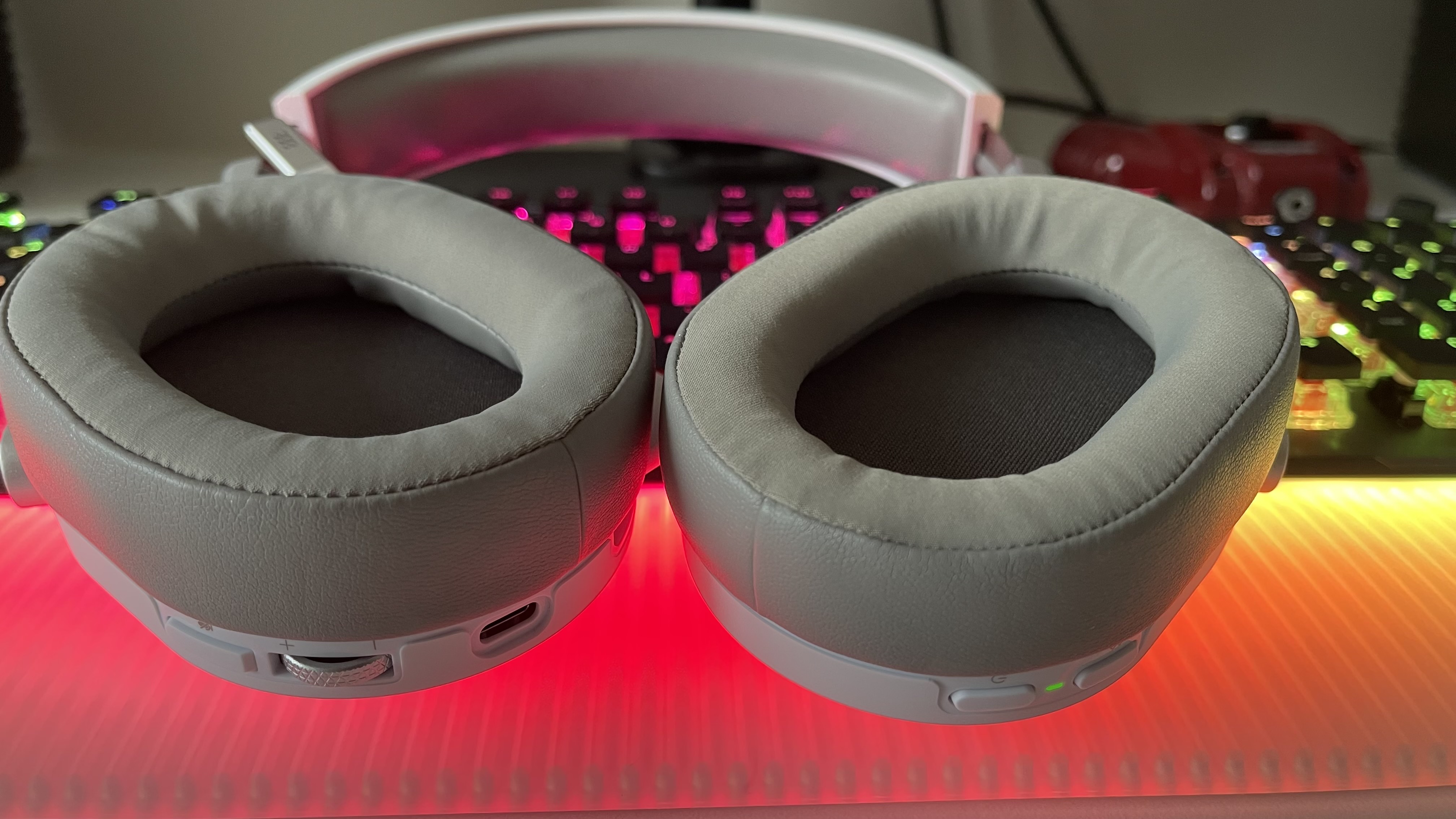
The properties of the sound are actually very similar to my current favourite HS80s - not quite as sharp and twinkly as a SteelSeries Arctis Pro Nova, a range famed for its emphasised high-end, but with ample clarity to play battle royales with confidence.
And there’s a touch more low-end body here. That’s probably down to the cushioning material. The pleather/silky cushion covers work together with the soft memory foam padding to create a pretty tight vacuum around your ear, and that always lets bass frequencies resonate with a bit more oomph. By comparison, the HS80’s fuzzy fabric cushioning covers let more sound escape, leading to a breezier response, something closer to an open-backed headset.
Should you buy the Corsair HS65 Wireless?
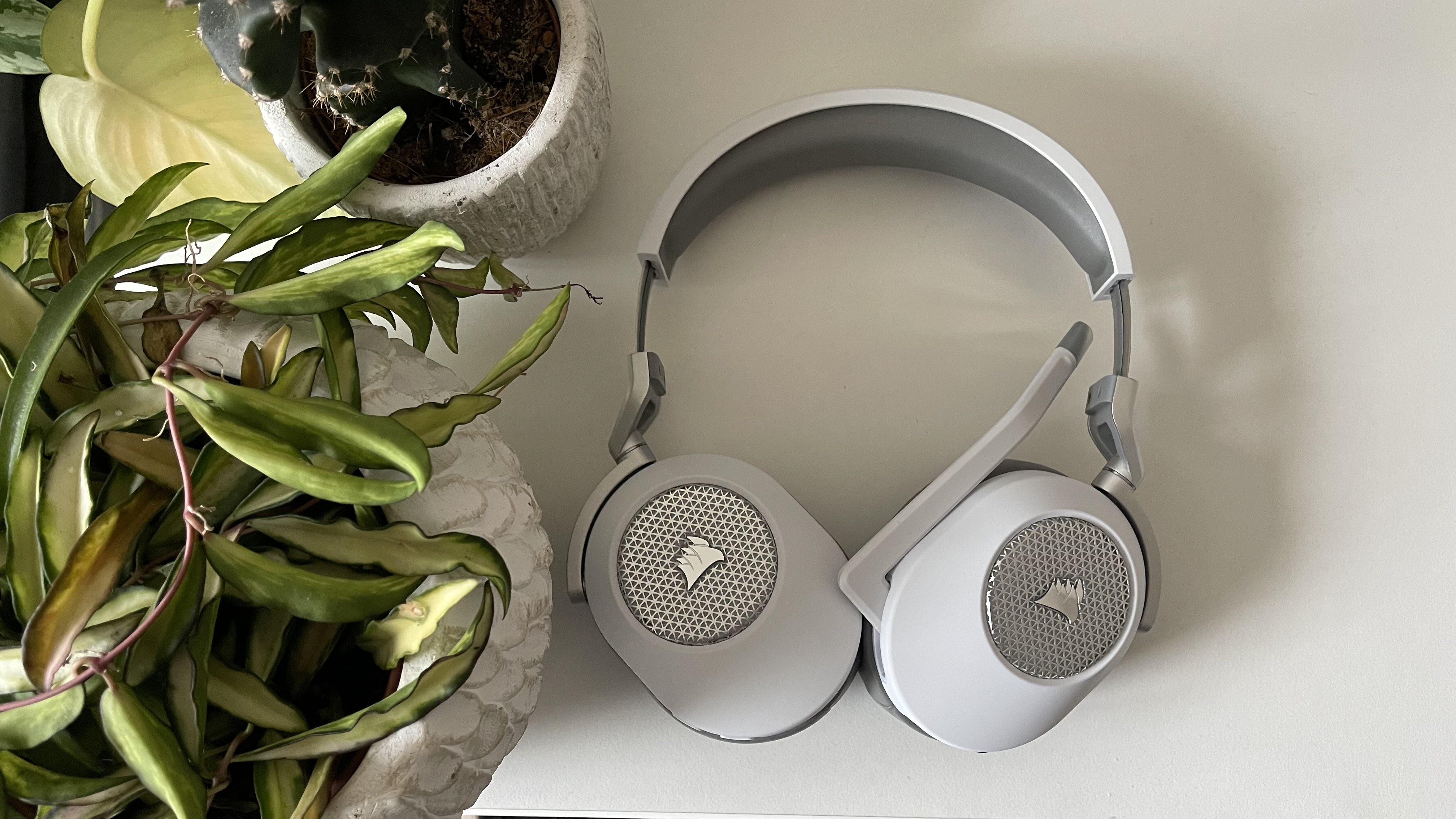
Building on the wired Corsair HS65’s already strong foundation, Corsair implements wireless connectivity the right way in this model. The dual wireless functionality is a real value proposition that justifies the higher pricing, as does the long battery life. 7.1 surround and the new SoundID configuration system don’t add a huge amount, but the basics are brilliant enough that it doesn’t need extra tricks. Solid build, good stereo audio, and dependable wireless.
How we tested the Corsair HS65 Wireless
We put the HS65 through a few wireless charge cycles to get an idea of its true battery life, playing many hours of PUBG, Atomic Heart, FIFA 23 and others along the way. As always, Discord’s the best place to get a crowdsourced review of a headset mic, and the consensus was that this is a real gem. I also listened to plenty of music on my smartphone with the HS65s, using the Bluetooth connection. Skrillex - Cinema is a tried and tested low-end evaluation (for 10+ years of testing now!) while breathier jazz recordings give a good idea of the warmth and high-end clarity. You can find out more about how we test gaming headsets in our full GamesRadar+ Hardware Policy.
We're also rounding up all the best PS5 headsets and the best Xbox Series X headsets, or for on-the-go play, check out the latest and greatest Nintendo Switch headsets on the market.
Phil Iwaniuk is a multi-faceted journalist, video producer, presenter, and reviewer. Specialising in PC hardware and gaming, he's written for publications including PCGamesN, PC Gamer, GamesRadar, The Guardian, Tom's Hardware, TechRadar, Eurogamer, Trusted Reviews, VG247, Yallo, IGN, and Rolling Stone, among others.
